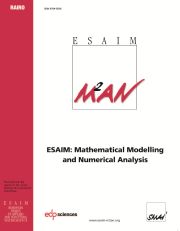Article contents
Steady tearing mode instabilitieswith a resistivity depending on a flux function
Published online by Cambridge University Press: 15 August 2002
Abstract
We consider plasma tearing mode instabilities when the resistivity depends on a flux function (ψ), for the plane slab model.This problem, represented by the MHD equations, is studied as a bifurcation problem. Forso doing, it is written in the form (I(.)-T(S,.)) = 0, whereT(S,.) is a compact operator in a suitable space and S is the bifurcationparameter.In this work, the resistivity is not assumed to be a given quantity (as usuallydone in previous papers, see [1,2,5,7,8,9,10], but it depends nonlinearly of the unknowns of the problem; this is the main difficulty, with newmathematical results.We also develop in this paper a 1D code to compute bifurcation points from the trivialbranch (equilibrium state).
Information
- Type
- Research Article
- Information
- ESAIM: Mathematical Modelling and Numerical Analysis , Volume 33 , Issue 6 , November 1999 , pp. 1135 - 1148
- Copyright
- © EDP Sciences, SMAI, 1999
- 2
- Cited by

